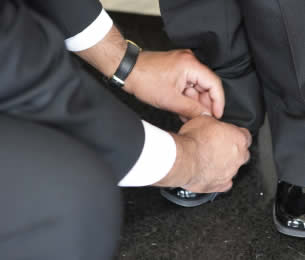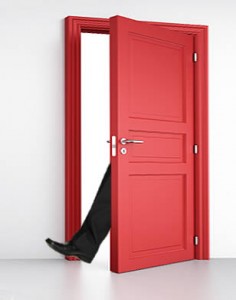Make a Crazy Request, Close the Deal
 When salespeople hope to close a deal, they may try doing favors for the client. In fact, scientists who study human behavior know that the opposite strategy can work: if you can get someone to do YOU a small favor, they are much more likely to grant a bigger one. This has been shown to work in many situations, including one experiment in which people agreed to have a large yard sign installed after first accepting a small window decal. A favor as simple as answering a request for the time of day can lead to granting more complex favors.
When salespeople hope to close a deal, they may try doing favors for the client. In fact, scientists who study human behavior know that the opposite strategy can work: if you can get someone to do YOU a small favor, they are much more likely to grant a bigger one. This has been shown to work in many situations, including one experiment in which people agreed to have a large yard sign installed after first accepting a small window decal. A favor as simple as answering a request for the time of day can lead to granting more complex favors.
In my book Brainfluence, I suggest that a salesperson should ask for a cup of coffee or glass of water, or seek a tiny trial order, as a means of opening the door to closing a sale. Now, a set of experiments performed by Warsaw professor Dariusz Dolinski shows that there’s an even more powerful favor strategy.
Get Your Foot in the Door
 The concept of asking for a small, easy to grant, favor in advance of a bigger request is often called the “foot in the door” technique. Past research has shown that when the initial request is more demanding, if a subject agrees to it then the probability of fufilling the second even more difficult request is higher. Of course, more complex or time consuming initial requests are likely to have a lower initial success rate.
The concept of asking for a small, easy to grant, favor in advance of a bigger request is often called the “foot in the door” technique. Past research has shown that when the initial request is more demanding, if a subject agrees to it then the probability of fufilling the second even more difficult request is higher. Of course, more complex or time consuming initial requests are likely to have a lower initial success rate.
Dolinksi used the “favor on the street” experiment often used in past research of this type. But, instead of a merely simple request, the experimenter asked the unwitting subjects to perform a task that was simple but unusual: to tie his shoe (offering the explanation of an injured back). The unusual tasks, even though simple and quick, had the same lift on on subsequent requests as more complex ones.
So, to persuade a customer (or donor, co-worker, etc.) to do something, consider starting off with a very simple but unusual request. You could try the same “tie-my-shoe” technique used in the research, but I’ll leave it to your imagination to come up with an approach that fits the individual situation. Here are a few totally random ideas:
- “Check the back of my jacket for a bug?”
- “Look up my mother’s phone number on your computer?”
- “Keep this paperweight on your desk until my next visit?”
If you buy into Dolinksi’s research, make the task as quick and simple as you can, just be sure it’s unusual or even a little startling. Then, some time after your prospect complies, ask for what you really want.
Got an idea for a simple but unusual request? Share it in a comment!
